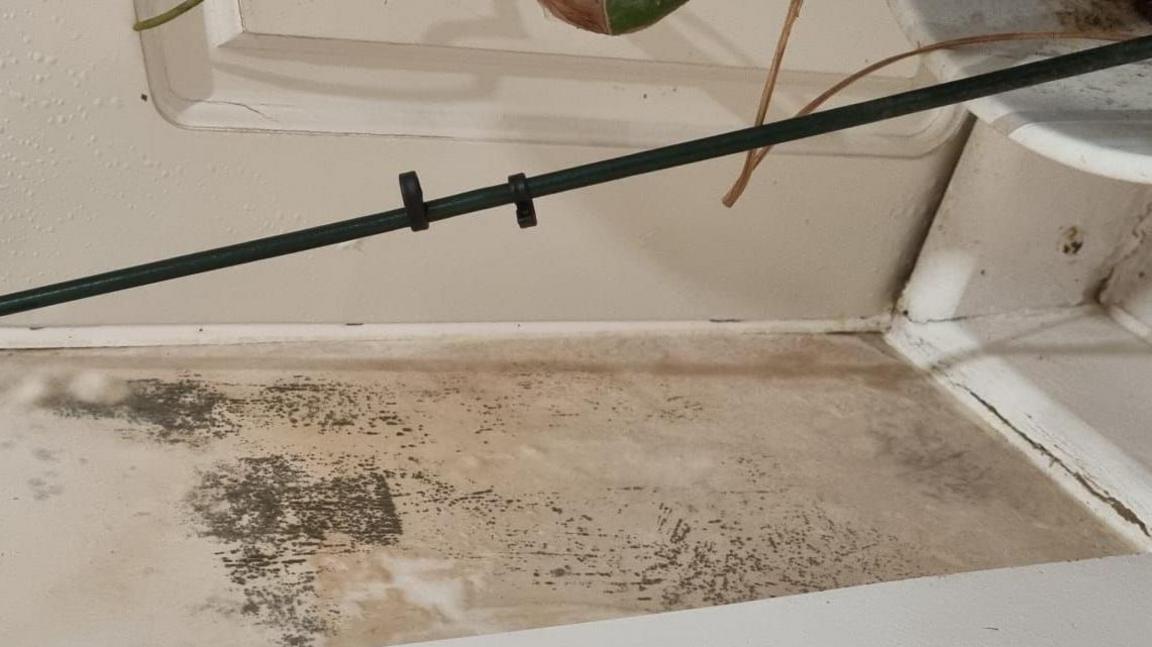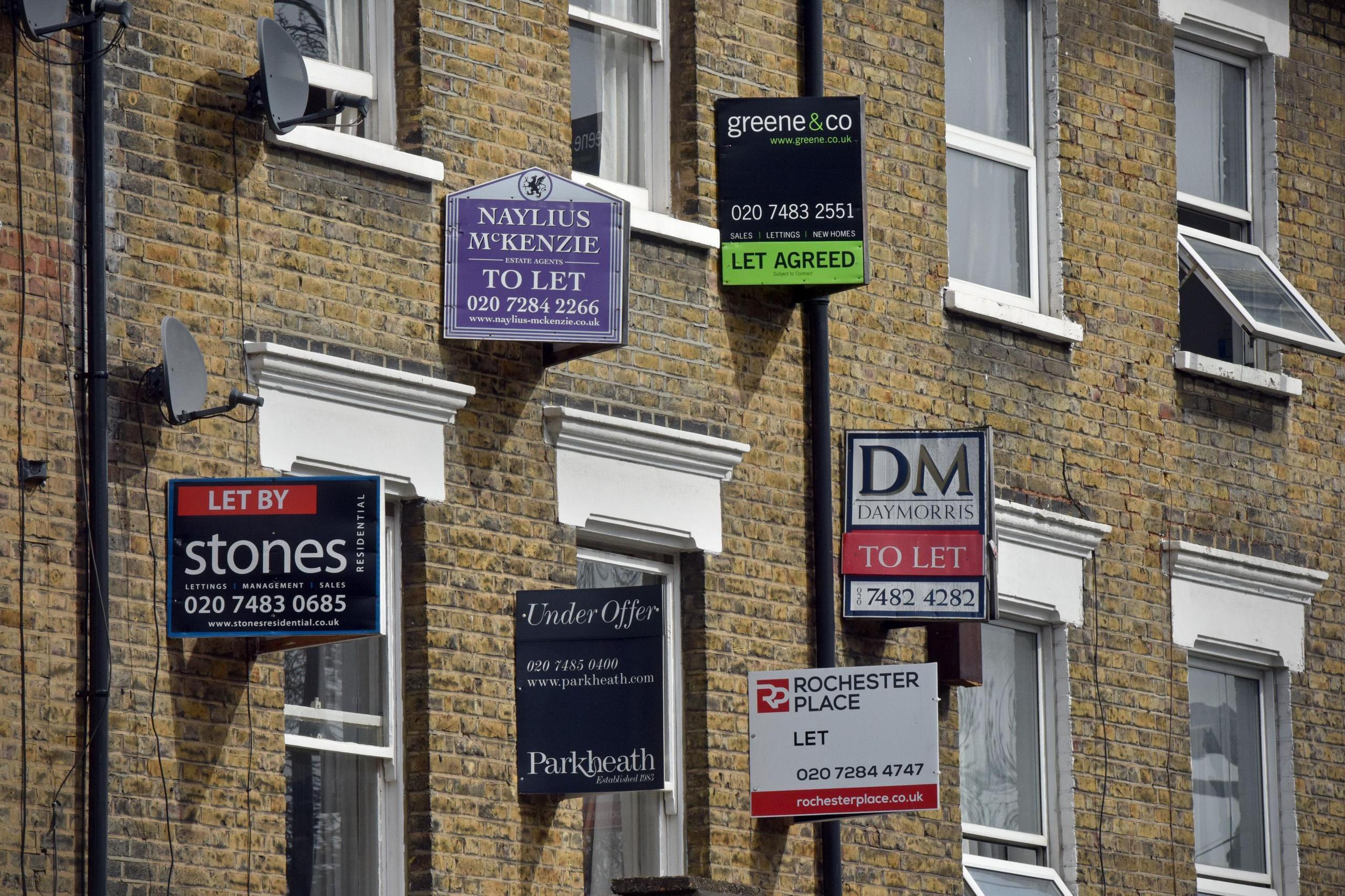'I had panic attacks after my eviction notice'

Linn Johansson was told she had two months to leave her home
- Published
A year ago, the government published plans for new laws that promised to put an end to the uncertainty caused by a tenant being issued a Section 21 notice. This allows landlords to evict tenants without a reason within eight weeks, in what is known as a no-fault eviction.
But groups representing renters say laws have been "watered down".
"It’s one of the worst things you can put someone through." That’s how Linn Johansson describes being served with a Section 21 notice.

Mould in Linn's former home
She says the stress of facing homelessness was terrifying.
"I experienced panic attacks for the first time in my life.
"It’s the feeling of not knowing where you’re going to go. It was horrible, awful," she explains.
Service charges: Who, what, where, when, why?
- Published13 April 2024
'We can’t sell our flat and can’t afford to live in it'
- Published14 March 2024
Council ordered to pay family it failed to house
- Published16 May 2024
Linn says she was evicted after complaining to her landlord about mould in the property that was causing her health problems.
The government has promised to ban the practice of issuing "no fault" eviction notices but campaigners say that process is taking too long.
The Renters Reform Bill promised to offer greater security for tenants but, at the moment, many feel very insecure about their housing situation.

Disrepair in Linn's former home
Florence, 29, says she and her three housemates were served a Section 21 notice 15 months into a two-year contract after she tried to negotiate when her landlord put the rent up by 31%.
She says trying to get a new deposit together and to find a new home in eight weeks was extremely difficult.
"A lot of people my age and living in shared houses are quite worn down by the fact that every year or two years you're having to move, and every time you're moving, your rent is increasing."

Florence was served an eviction notice after her rent was put up
A year ago, Housing Secretary Michael Gove published plans to put an end to this sort of scenario, in the form of the Renters Reform Bill - something that was welcomed by renters' and landlord groups.
Plans to allow people to request to have a pet, as well as making it illegal to have blanket bans on renting to people on benefits or those with children, made headlines. But arguably the biggest change in the Bill would be banning Section 21.
A year on, and as the new laws are being debated in the House of Lords, many of those once-hopeful campaign groups have been left disappointed.
They believe the laws have been "watered down" and amendments made in the Commons have been favourable to landlords - something the government denies, external.

Michael Gove said renting reforms were "once in a generation"
But last month MPs voted in favour of government plans to delay ending no-fault evictions while the effects of the new tenancy system on the county courts are assessed.
Tom Darling, campaign manager at the Renters’ Reform Coalition (RRC), says the "long-promised abolition of Section 21 has now been kicked into the long grass, indefinitely delayed after the government caved to the landlord lobby’s demands and watered down the Renters Reform Bill".
He adds: "The current version of the Bill will abolish no-fault evictions in name only, upholding the balance of power that has created the renting crisis we have today – it’s no wonder that landlords now welcome it.
"If this legislation is not fixed in the House of Lords it will fail to address the renting crisis – a crisis which will only continue to grow without further action."

Paul Roberts says new laws are "toothless"
While this new legislation was announced a year ago, you have to go back four prime ministers and five years to when the promise of abolishing Section 21 was first made, external.
The RRC - a campaign group that comprises 20 leading organisations supporting and representing private renters - says that between the April 2019 announcement and the end of last year, 15,660 households in London have been made homeless or threatened with homelessness following the issuing of a Section 21 order.
The data only includes households that have gone to their local council for support so is likely to be a fraction of the actual number.
And it’s not just people in London who are affected.
Paul Roberts, from Stroud in Gloucestershire, says receiving an eviction notice was "terrible".

Five years ago while Theresa May was in power, the Tories pledged to scrap Section 21
The 70-year-old says he had lived in his home for 16 years and built a community around him.
"I was happy there, and I looked after the place. It might have been owned by my landlord, but it was my home, and I cared for it, paid my rent on the nail, never missed a beat in 16 years."
He says getting an eviction notice was a "heck of a shock" and he couldn’t find anywhere else in the area as rents had gone "sky high". Discovering his pension wouldn’t cover local rents was also "really scary".
Under the proposed new laws, Mr Roberts' landlord would have still been able to evict him as he wanted to sell the property.
The proposals will allow landlords to repossess their home if they want to sell it, or if they or close family wish to move into it.
Mr Roberts says homes should be seen as more than an "asset" and amendments to the Bill have made it "toothless".
"I think it's criminal, and, you know, if I was a bit dark about it... I would be thinking it would just be the fact that all the MPs own properties and that sort of thing, because it's really been mauled… all the teeth have been removed from the Bill. It gives no protection at all."
The National Residential Landlords Association dismisses such claims as "nonsense".
Ben Beadle, its chief executive, said: "The Bill does not delay the end of Section 21 indefinitely. The planned review of the courts will take place after Section 21 is ended for new tenancies, but before it is scrapped for existing ones.
"The government cannot set the date for this until the Bill is passed by the House of Lords."

The government says new laws will strengthen powers for landlords to evict problem tenants
Nevertheless, some landlords are frustrated at how long the new laws are taking to come into force and current court delays have left them out of pocket.
I have spoken to two landlords who say it’s taken them more than a year to evict tenants after issuing section 21 notices and going through the courts to enforce them.
One of them, Raj, 54, owns a rental property in Harrow. He says the process was "devastating” and “extremely stressful".
He describes how his previous tenant built up rent arrears of £16,000 and he then had to pay about £4,000 in court costs before they were finally forced out.
"The tenant had all the rights," he says, adding that the court delays prolonged the situation.
"There’s nothing you can do. I just had to wait and wait and wait. It’s a long, long process.
"The backlog is horrendous," he adds.
He believes new legislation will do little to change situations like the one he was left in.
"I am out of pocket, and I am never going to see that money.
"I couldn’t afford another situation like this again," he says.
The government says the new laws will make it easier for landlords to repossess properties where tenants exhibit anti-social behaviour or repeatedly build up rent arrears.
We did ask minister for an interview but the government declined.
Instead, a Department for Levelling Up, Housing and Communities spokesperson said in a statement: "The Renters Reform Bill will deliver our manifesto commitment to abolish Section 21 no-fault evictions and ensure a fairer private rented sector for both tenants and landlords.
"These are the biggest changes to the sector in 30 years – and we will continue to work to ensure the Bill passes into law as soon as possible."
Listen to the best of BBC Radio London on Sounds and follow BBC London on Facebook, external, X, external and Instagram, external. Send your story ideas to hello.bbclondon@bbc.co.uk
- Published17 May 2023

- Published24 October 2023

- Published28 February 2024
